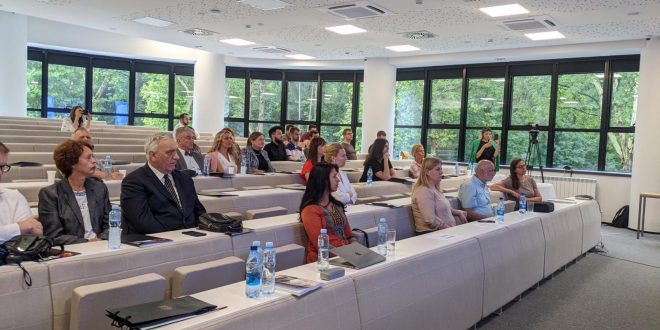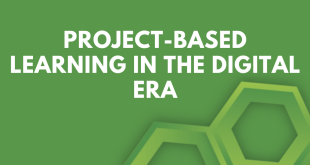The second international conference of E-business technologies – EBT organized by the Department of E-Business was officially opened on Thursday, June 23, 2022, at the Faculty of Organizational Sciences.
The primary goal of the conference is to bring together leading professors, scientists, researchers and practitioners, the most successful IT companies and students in one place to present ideas and examples from practice in the field of digital business.
At the opening ceremony spoke Prof. dr Zorica Bogdanović, full professor at FOS, Prof. dr Dusan Barać, Vice-dean for Digital development at FOS and Doc. dr Bane Popadić.
Keynote lectures were held by Prof. dr Marko Suvajdžić, associate professor at Digital Arts and Sciences, University of Florida, Prof. dr Vladan Devedžić, corresponding member of SASA, professor at FOS and Prof. dr Dejan Milojičić, president of IEEE Computer Society (2014), Hewlett Packard Labs.
The grand opening and keynote lecture were followed by a cocktail party at FOS’s employee club.
In the afternoon, parallel sections were held for topics:
- DIGITAL BUSINESS ECOSYSTEMS,
- IOT AND SMART ENVIRONMENTS,
- ЭЛЕКТРОННЫЙ БИЗНЕС И ЦИФРОВАЯ ЭКОНОМИКА,
- SMART HEALTHCARE, BLOCKCHAIN
- PROJECT-BASED LEARNING AND E-LEARNING.
The DIGITAL BUSINESS ECOSYSTEMS section was chaired by Prof. dr Dragan Vukmirović. The following lectures were held within the section:
- Do we need e-Business management or not? A Critical Literature Review
Yüksel Akay Ünvan, Ahmet Şükrü Pampal - The methodological approach to introducing a new fashion brand to the digital market
Milica Simić, Vukašin Despotović, Marija Jović, Aleksandra Labus, Marijana Despotović-Zrakić - Innovations in museum financing: Potential of Civic Crowdfunding
Miloš Milosavljević, Željko Spasenić, Nemanja Milanović, Slađana Benković - Agent-Based Modeling Financial Services in Social Networks
Igor Klioutchnikov, Maria Sigova, Anna Klioutchnikova - Open Innovation and Crowdsourcing: Challenges and Opportunities for Serbian Railways
Nenad Stanisavljević, Danijela Stojanović, Luka Petrović - Open innovations and the role of hackathons
Tamara Naumović, Boris Vajagić, Lazar Cvetković, Miloš Proročić
The IOT AND SMART ENVIRONMENTS section was chaired by Prof. dr Aleksandra Labus. The following lectures were held within the section:
- A Modeling, Simulation, and Setting the Control Parameters for Automation of Irrigation System Using PID and ANN methods
Ravi Kant Jain - NFC enabled Wi-Fi managging system for ESP32 based IoT system
Nikola Mitrović, Milan Đorđević, Sandra Veljković, Danijel Danković - Designing a data streaming infrastructure for a smart city crowdsensing platform
Aleksa Miletić, Petar Lukovac, Branislav Jovanić, Božidar Radenković - Monetization and pricing of the 5G-enabled smart residential services
Mirjana Stojanović - Internet of Things and The Smart City Project Case Study – The Smart City of Tripoli – Libya
Asmaeil Ali Mohamed Akhmaaj
The ЭЛЕКТРОННЫЙ БИЗНЕС И ЦИФРОВАЯ ЭКОНОМИКА section was chaired by prof.dr Райко М. Буквич. The following lectures were held within the section:
- Влияние интернета и цифровой экономики на развитие конкуренции: что мы можем сказать о Сербии
Райко М. Буквич - Кризис банковского маркетинга в условиях грядущего Open Banking
Мария В. Сигова, Сергей А. Васильев, Валерий А. Долбежкин - Бенчмаркинг как инструмент развития предприятий и отраслей в условиях цифровой трансформации экономики
Елена А. Мидлер, Инна А. Круглова, Ирина А. Никитина - Diagnostics of using IT in agriculture of the Nizhny Novgorod region
Nikolay Zavivaev - Dairy farming. Prospects for digitalization
Tatyana Kirilova - Estimation of Energy Costs in a Network Cyber- Kinematic System with Mobile Devices
Tatyana Astakhova, Darya Kirilova, Mikhail Kolbanyov - Digital twin as a driver of digitalization of organizations’ activities and creation of digital models
Mikhail Kolbanev, Tatyana Astakhova, Anna Krasnova, Anna Romanova
The SMART HEALTHCARE section as well as BLOCKCHAIN was chaired by Prof. dr Dušan Barać. The following lectures were held within the section:
- Strategic marketing planning in secondary healthcare institutions
Miroslav Kendrišić, Artur Bjelica, Branka Rodić, Dušan Višnjić, Tamara Đorđević - The Importance of digital transformation processes in medicines regulatory authorities for E-Health
Tatjana Stojadinović, Ilija Antović - A System For Monitoring And Managing The Anxiety Among The Young People Using Machine Learning
Farhad Lotfi, Branka Rodić, Zorica Bogdanović - Blockchain platform selection with a focus on smart contracts usage
Nikola Matijasević, Marko Đogatović, Gordana Radivojević - Analysis of potential NFT applications
Vukašin Despotović, Daniel Bjelica, Dušan Barać - Registry as a tool to fight utility NFT reg pull
Miodrag Šljukić
The section PROJECT LEARNING AND E-LEARNING was chaired by Prof. dr Zorica Bogdanovic. The following lectures were held within the section:
- Designing an LMS-ePortfolio Integration and Implementation Model in E-Business Education
Teklehaimanot Embaye - Managing students’ projects in e-learning
Boris Odalović, Jelena Mihajlović Milićević - Project based learning for DevOps : School of Computing experiences
Miloš Radenković, Snežana Popović, Svetlana Mitrović - Data streaming architecture based on Apache Kafka and GitHub for tracking students’ activity in higher education software development courses
Milan Miloradović, Ana Milovanović - Project Based Learning in Vocational Studies
Miloš Mijić, Branko Ćebić - Comparison of learning outcomes in the traditional and e-learning model in higher education
Srđan Barzut, Ana Petrović - Analysing the similarity of students’ programming assignments
Tatjana Stojanović, Saša Lazarević
Within the EBT conference, a section Bubble.io no code platform was held, chaired by Bubble researcher and educator Marija Vitaz. Bubble.io is a no-code development platform that is at the same time visual programming tool and a cloud platform. Bubble enables creating digital products without needing to type code, instead, users draw the interface of their application by dragging and dropping elements into a page and defining workflows to control the logic. In this way, both non-technical and technical people can build their applications in a short time and with less funds invested.
On Friday, June 24, student presentations were held on the topic of Project-based learning in multinational teams: Developing Customer Journey Maps.
All content could be tracked online. In front of the program committee, the conference was closed on June 24 by Prof. dr Zorica Bogdanović.
 Department of e-business University of Belgrade, Faculty of organizational sciences
Department of e-business University of Belgrade, Faculty of organizational sciences






















